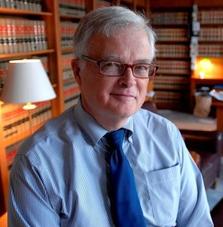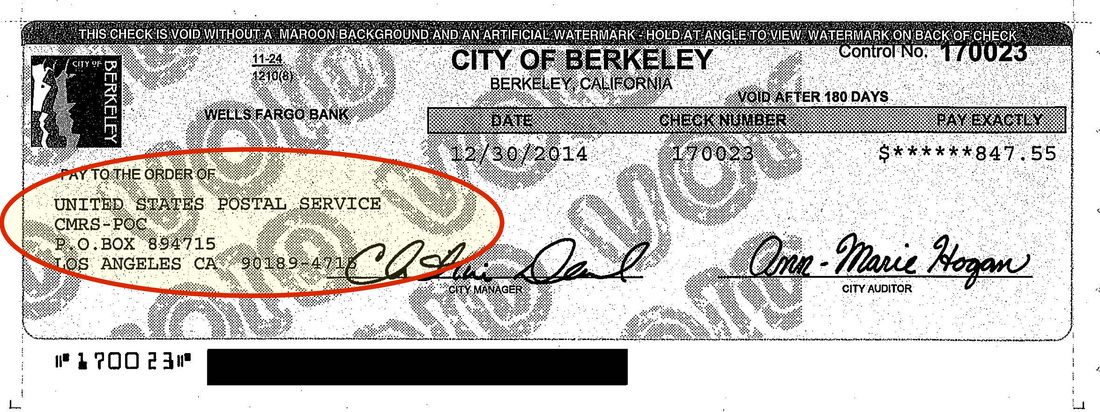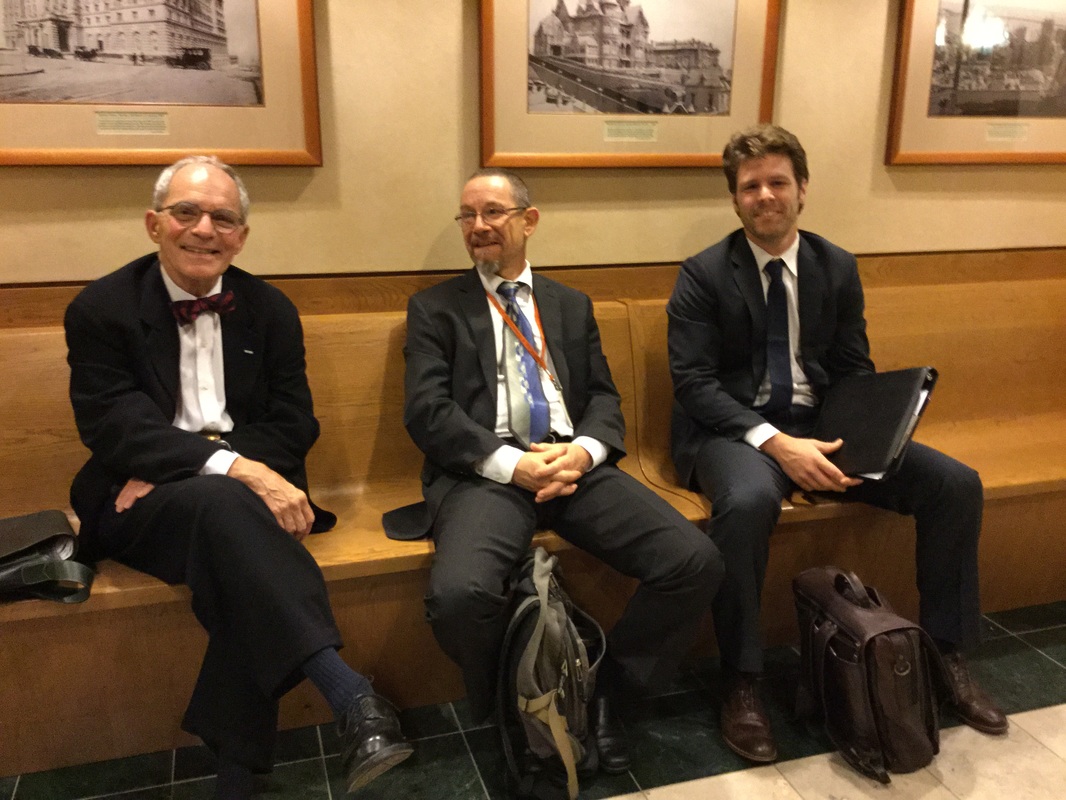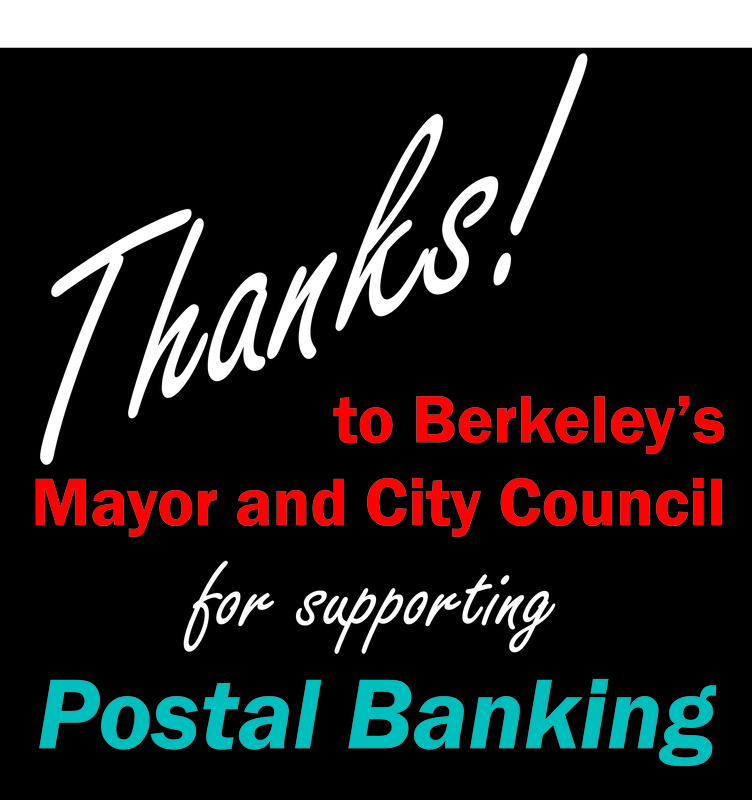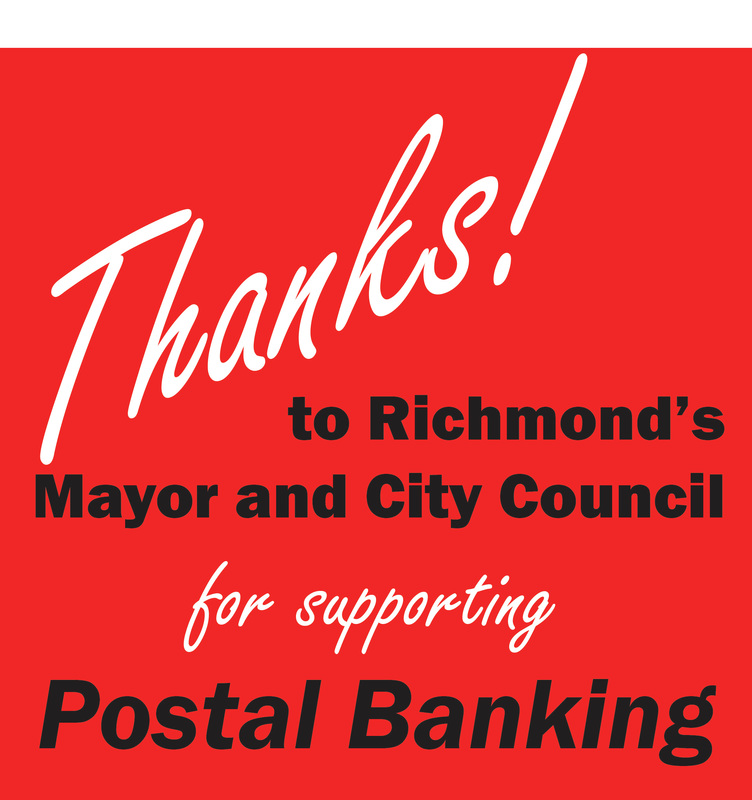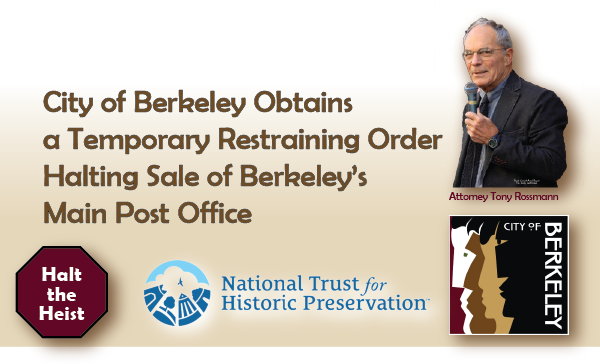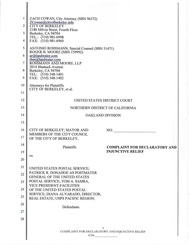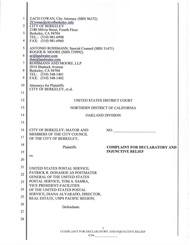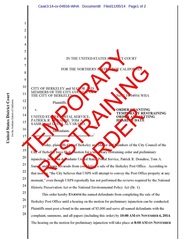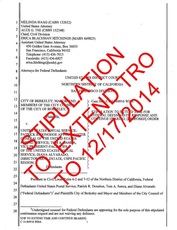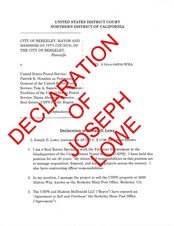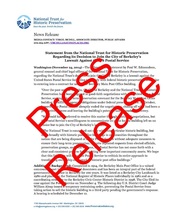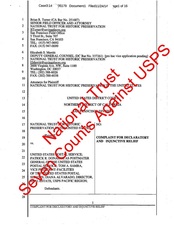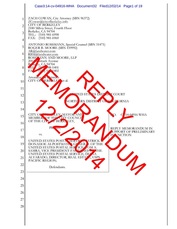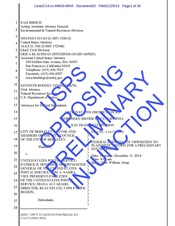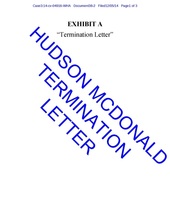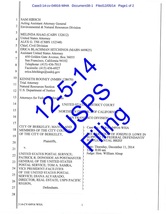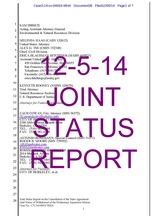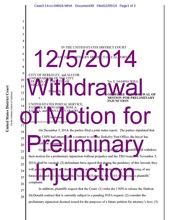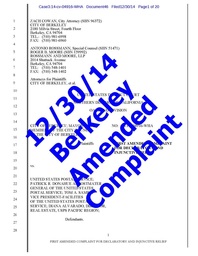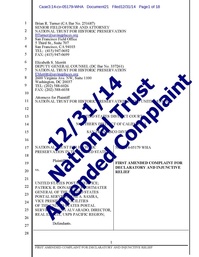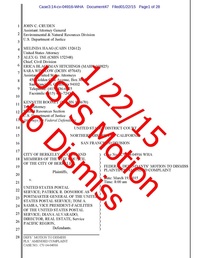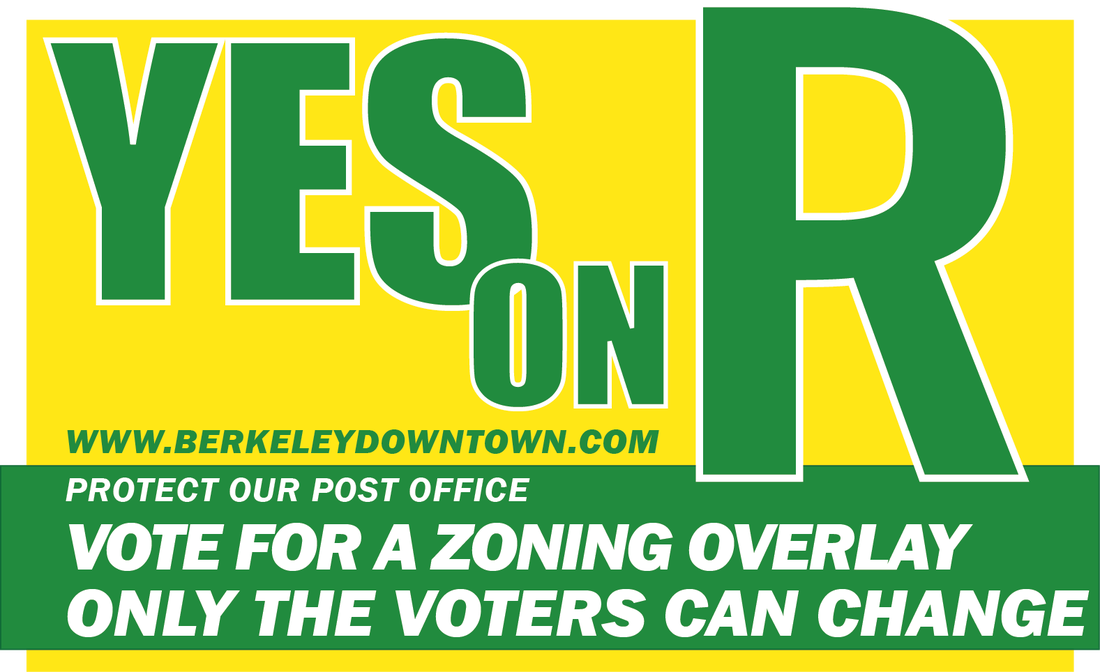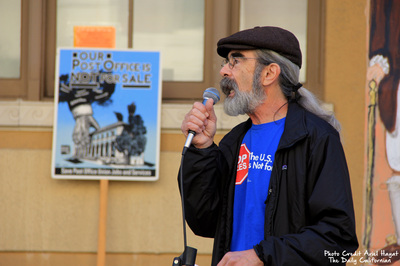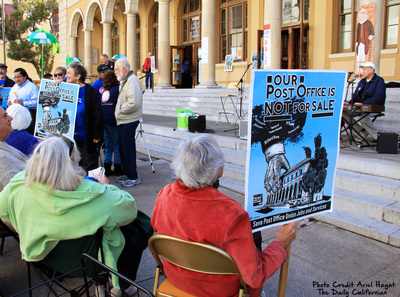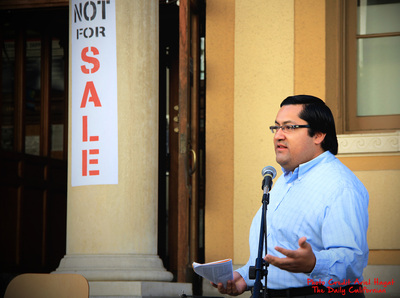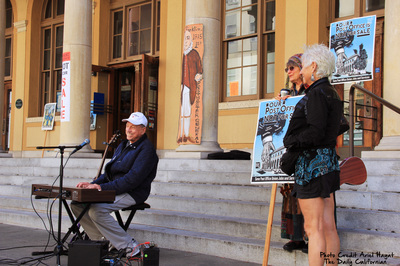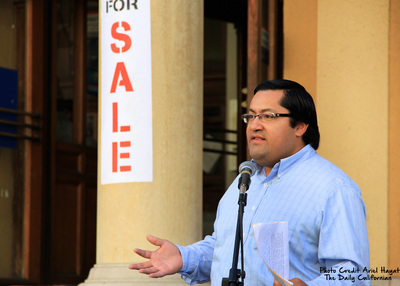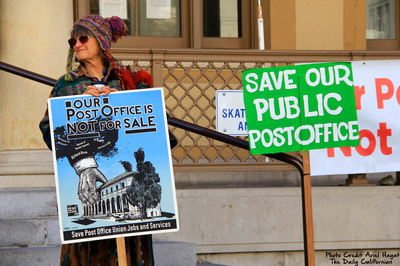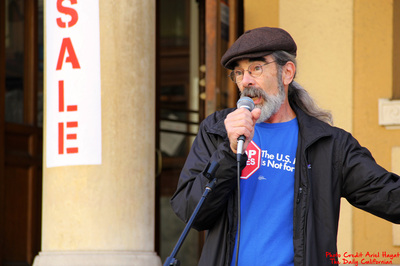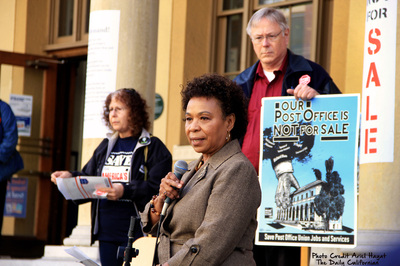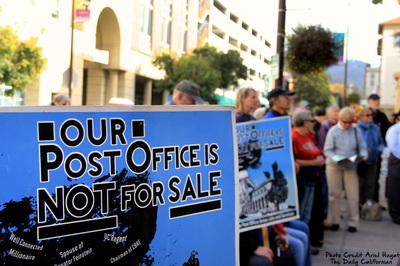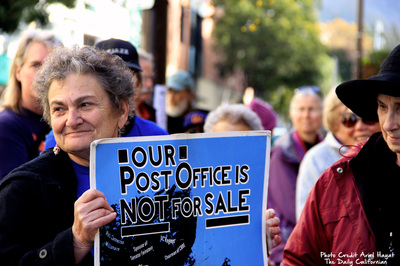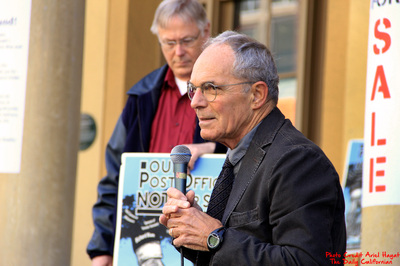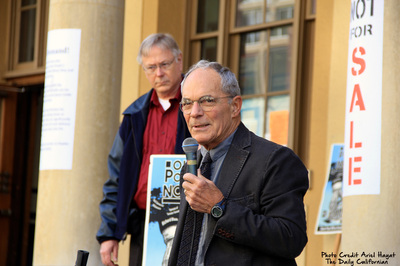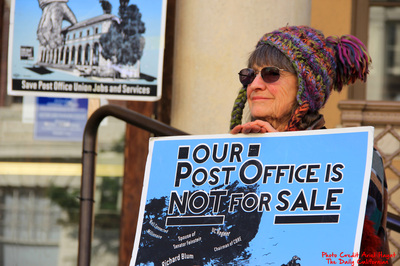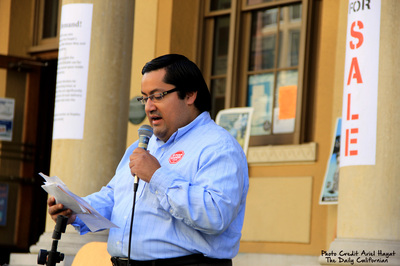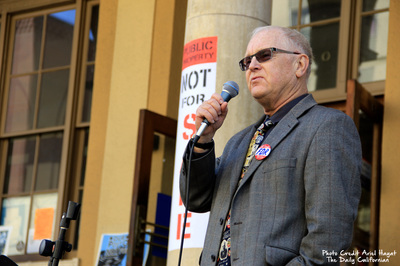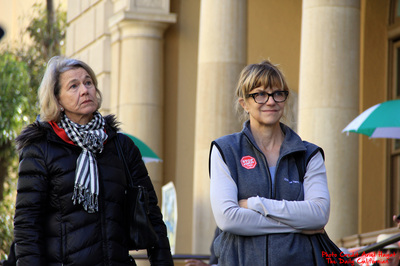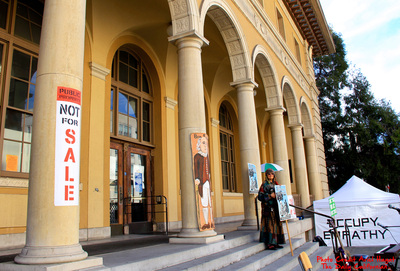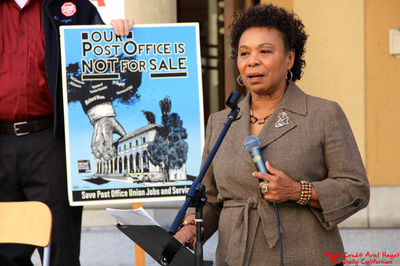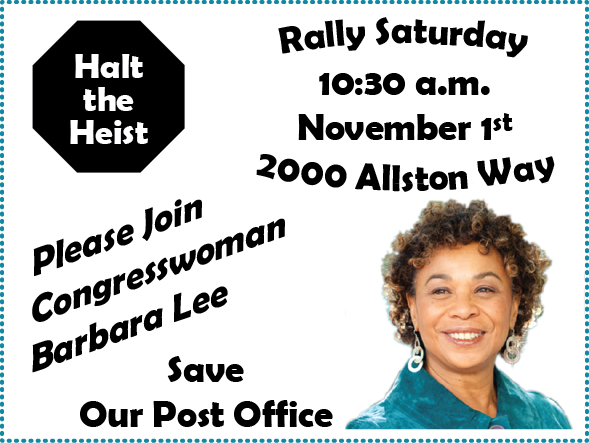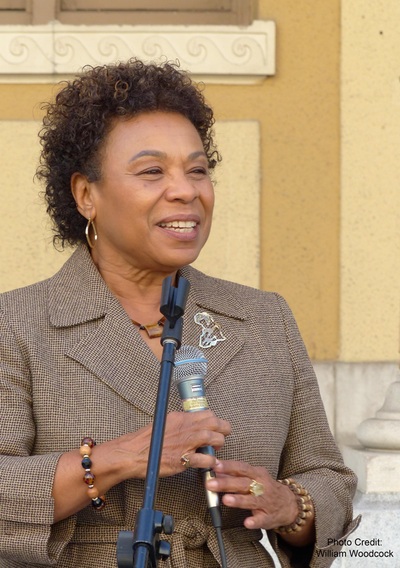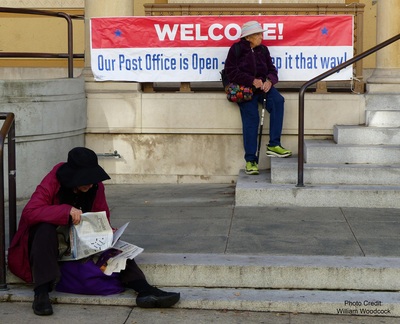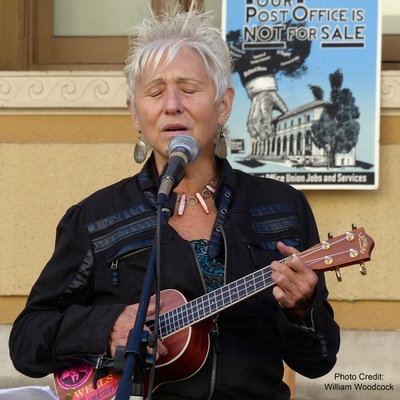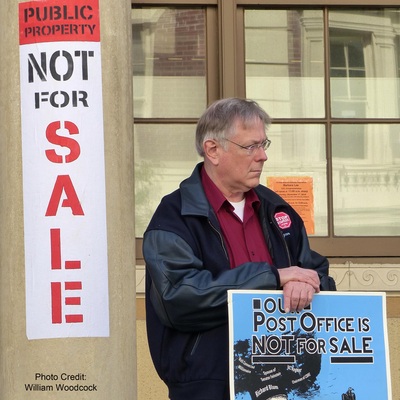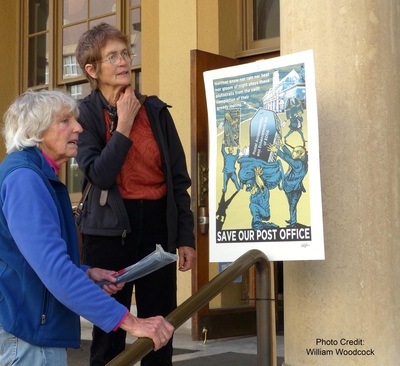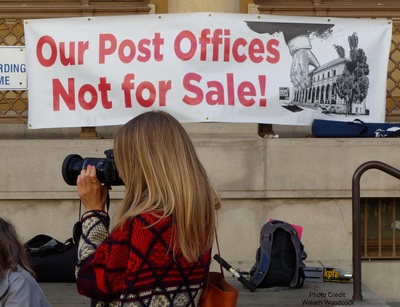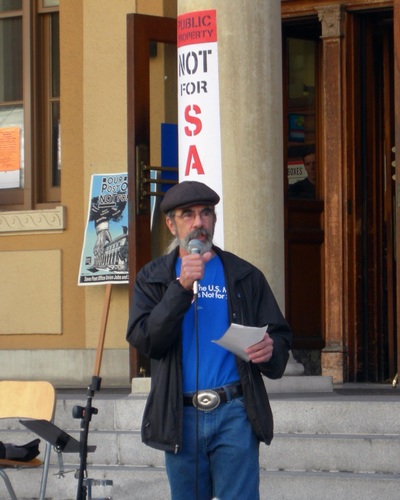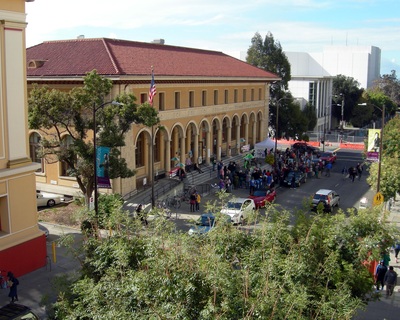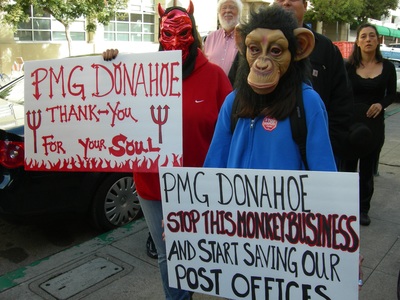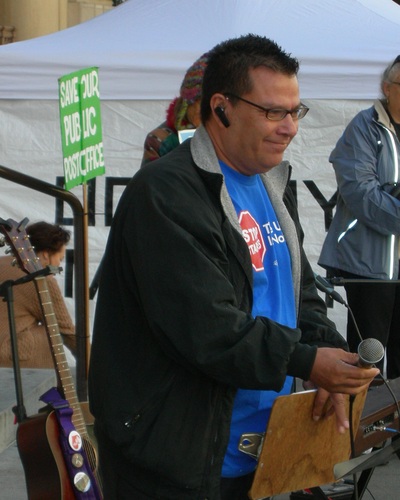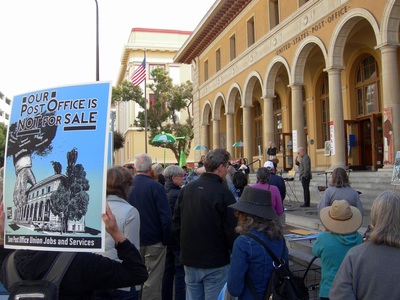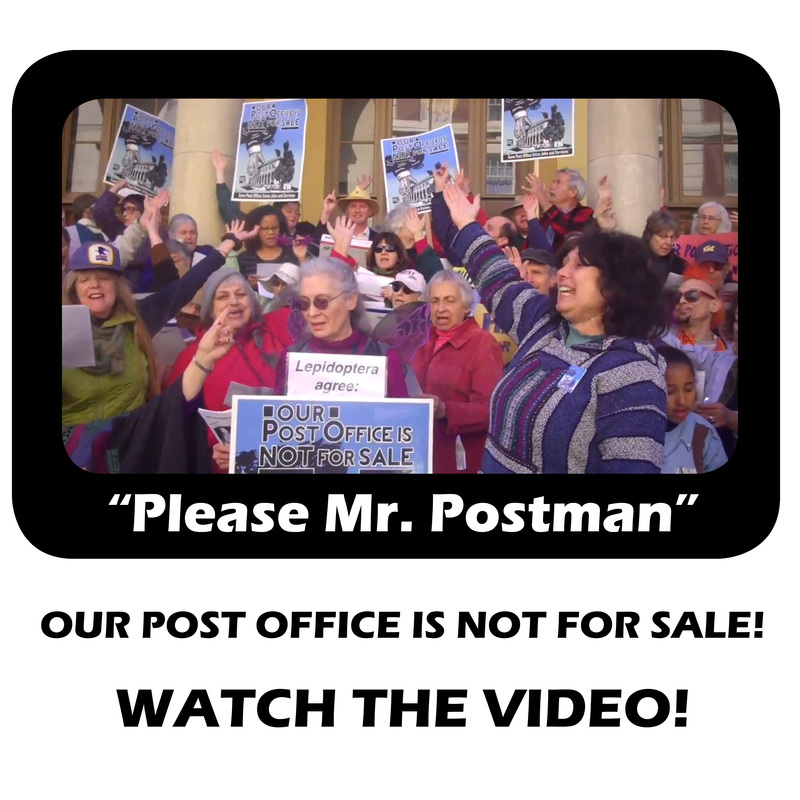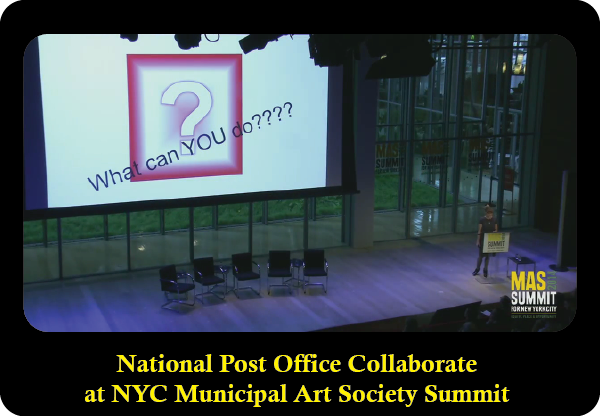Retains Jurisdiction until April 16, 2020 SAN FRANCISCO, CA: On Thursday, April 16, 2015, U.S. District Judge William Alsup issued a further order on the case involving the efforts by the U.S. Postal Service to sell Berkeley's historic Main Post Office at 2000 Allston Way. As a follow-up to the order dismissing the case as moot, Judge Alsup has retained jurisdiction until April 16, 2020 to enforce the requirement that the U.S. Postal Service provides the City of Berkeley and the National Trust for Historic Preservation with a 42-day notice in advance of the closing of any future sale of the building or of any final determination to relocate services. Since supporters of the Berkeley Post Office are cautious in relying on statements made by the U.S. Postal Service, Alsup's order was very welcome news. Click here to view the April 16th order. |
|
0 Comments
A New Phase in the Fight to Save Our Post Office
Hey USPS! Release the Structural Report!
Excess Space? Lease it out. We understand that 2000 Allston Way has more space than the Postal Service is currently able to efficiently use. The Postal Service’s Inspector General is currently assessing how the Postal Service can make the most efficient use of unused space. We believe that in seeking tenants for unused space at 2000 Allston Way, the Postal Service should select tenants who are able to both provide income to the Postal Service and to honor and enhance the public function of the building.
An analysis by the Inspector General found that offering increased financial services (Postal Banking) will increase Postal Service revenue. 2000 Allston Way is a superb location for a Postal Banking pilot program. SAN FRANCISCO, CA: On Tuesday, April 14, 2015, Judge William Alsup dismissed as “moot without prejudice to the filing of a new lawsuit when plaintiffs have suffered a cognizable injury” two cases from the City of Berkeley and the National Trust for Historic Preservation. Both legal actions asserted that the U.S. Postal Service has failed to comply with environmental and historic preservation laws while attempting to sell the Main Berkeley Post Office. Statement from the Berkeley City Attorney's Office While the cases were dismissed, the result of Judge Alsup’s order is actually quite favorable to the plaintiffs, because in order to render the cases moot, the USPS had to formally rescind its decision to relocate the post office from 2000 Allston Way. The decision to relocate was the USPS’s first step in moving towards a sale. As a result, the USPS is back at square one, and there is no longer any decision to relocate postal services out of the Main Post Office at 2000 Allston Way. Limited Victory Judge Alsup’s ruling protects Berkeley’s downtown post office from a secret sale. Attorneys Tony Rossmann, pro bono attorney for the city of Berkeley, and Brian Turner of the National Trust for Historic Preservation, did great work. But there’s no resolution to the issues. Had the case been heard on its merits, the federal courts would have spoken on whether the Postal Service must comply with historic preservation and environmental laws across the country. Congresswoman Barbara Lee has introduced a bill in the U.S. House of Representatives that will prevent the U.S. Postal Service from closing or selling any historic post office without the approval of Congress. With Lee’s bill and the documented failings of the Postal Service, we will continue to push the administrators of the U.S. Postal Service to hold up their responsibility to safeguard America’s historic post offices. Recent chronology and links to latest documentsOn March 26, 2015, Judge Alsup heard arguments in his courtroom at 450 Golden Gate in San Francisco on whether to dismiss the suits as moot. At that time, Judge Alsup asked if the Postal Service intended to rescind its administrative decision “Final Determination on Relocation” to relocate/ sell Berkeley’s Main Post Office. Judge Alsup advised that his decision might be affected by whether or not the "Final Determination" had been rescinded.
The Postal Service responded on April 2, 2015, asserting that there was “no formal procedure for withdrawal of the 2013 Final Determination.” However, the Postal Service had indicated “that it would explore potential sales transactions that would include a lease-back provision, thereby allowing the Postal Service to lease a portion of the Berkeley Main Post Office for continued retail services.” As evidence of this, the Postal Service cited declarations of Diana Alvarado and of Joseph Lowe to the Court.
The City of Berkeley counter-responded on April 3, 2015. The court filing described to USPS response as “Lacking an authentic rescission, they provide a convoluted mirage designed to approximate one, which leaves in place the key decisions on which they relied to support sale of the property. It falls short in consistency, logic and law.” On April 14, Judge Alsup issued an “Order Dismissing the Case as Moot” and a “Judgement”. In dismissing the case as moot, Judge Alsup stated that “if the USPS enters into a sale agreement for the property, and if plaintiffs contend that future agreement violates NEPA and the NHPA, then that case would not evade review.”
Richmond, California City Council Supports Postal Banking
Epic Court Battle Berkeley and the National Trust are fighting in court to make the Postal Service follow national environmental and preservation law
Temporary Restraining Order Halts Sale of Berkeley's 1914 Post OfficeHere’s a recap of the legal maneuvering around the sale of Berkeley's historic Main Post Office that's occurred over the last six weeks: In late September the USPS walked away from negotiations with the city of Berkeley and the National Trust for Historic Preservation. The parties were attempting to draft a covenant to be held by the city of Berkeley that allowed the Postal Service to sell Berkeley’s Main Post Office but also (as required under federal law) protected the building's historic characteristics including its historic use and public access. In terminating negotiations, the USPS made a stunning announcement: The USPS would itself hold the preservation covenant. "USPS has no apparent interest in the long-term preservation of the property" On October 24, 2014, the Advisory Council on Historic Preservation (ACHP) responded to the USPS proposal. Their response tells you all you need to know about how well preserved Berkeley’s post office would be under this unprecedented Postal Service proposal: "It is the ACHP’s opinion that the proposed covenant does not sufficiently ensure the long-term preservation of the property since the USPS, as covenant holder, has the unfettered authority to approve adverse effects to the property (including demolition) while having neither the demonstrated experience in holding preservation covenants nor an apparent interest in the long term preservation of the property." On the same date, October 24, 2014, the joint CB Richard Ellis/ USPS website listed the Berkeley Main Post Office as “In Contract.” On October 31, 2014, the USPS unilaterally concluded the Section 106 process against the advice of the President’s Advisory Council on Historic Preservation, the California State Historic Preservation Officer and without the agreement of the city of Berkeley or the National Trust for Historic Preservation. On November 4, 2014, the city of Berkeley's counsel Tony Rossmann filed for a temporary restraining order against the U.S. Postal Service in U.S. District Court. The legal action stated that the Postal Service in concluding the Section 106 process had taken final agency action without ensuring compliance with either the National Environmental Policy Act or the National Historic Preservation Act. On November 5, 2014, U.S. District Judge William Alsup issued a temporary restraining order preventing the USPS from completing the sale of Berkeley’s Main Post Office. Hearing Set for Thursday, December 11, 2014 On November 6, 2014, the date for a hearing on a preliminary injunction was set for 8 a.m. Thursday, December 11, 2014. The hearing will be held in Judge Alsup’s courtroom, Courtroom 8, 19th floor, 450 Golden Gate, San Francisco. We anticipate that the National Trust for Historic Preservation will take part in the hearing on December 11th. The USPS has bullied communities around the country. Berkeley and the National Trust for Historic Preservation are standing up. It’s the right thing to do and our Mayor and City Council deserve praise for staying the course. Each sale of an historic post office across our country is a cumulative loss to our national heritage. We hope that the court will halt this heist of our national heritage. There are future options for Berkeley’s historic post office that have yet to be analyzed as alternatives. Those options include the Postal Service retaining custody of the building in trust for the American people. Below are links to documents filed in the U.S. District Court regarding the Berkeley Main Post Office.
Update: November 24, 2014 National Trust for Historic Preservation |
|||||||||||||||||||||||||||||||||||||||||||||||||||||||||||||||||||||||||||||||||||||||||||||||||||||||||||||||||||||||||||||||||||||||||||||||||||||||||||||||||||||||||||||||||||||||||||||||||||
| (Washington, D.C.) Statement of the National Trust for Historic Preservation: "In October, the Postal Service abruptly ended negotiations, closing off what had been a productive process and leaving the building’s potential sale shrouded in secrecy. [The National Trust] would have preferred to resolve this matter through continued negotiations, but the Postal Service’s unwillingness to communicate its plans for the building left us no choice but to join the City of Berkeley’s lawsuit.” Read the entire press release. |
| Five Violations under the National Historic Preservation Act:
|
Update December 3, 2014
Reply Memorandum by the City of Berkeley (filed December 2, 2014)
| The "Reply Memorandum" in support of the preliminary injunction was filed by the City of Berkeley on December 2nd. Starting on page 22 there is declaration by Berkeley City Attorney Zach Cowan that includes a timeline of the negotiations between the US Postal Service and the City of Berkeley. Read the "Reply Memorandum." |
Update December 4, 2014
USPS Filing in Opposition to the Preliminary Injunction
(filed November 25, 2014)
| "The [now cancelled] sales agreement includes a leaseback provision requiring the purchaser to provide for the Postal Service’s continued occupancy of retail space at the Property for an initial term of five years, with three five-year renewal options that the Postal Service can exercise at its sole discretion... As a result, there will be little, if any, change of use for the average postal customer and the public will retain regular access to historic features, including the Suzanne Scheuer mural, for a minimum of five years following the sale." READ the "Defendant's Filing Opposing the Preliminary Injunction." |
Update December 5, 2014
Joint Status Report on the Cancellation of the Sales Agreement and Notice of Withdrawal of the Preliminary Injunction Motion
| Hudson McDonald entered into a purchase agreement with USPS on September 22, 2014. The date is significant as it indicates that U.S. Postal Service employees have not been forthright in their dealings with the City of Berkeley. Berkeley City Attorney Zach Cowan writes: "As recently as September 23, 2014, I submitted my proposed revised [covenant] language to the USPS at the verbal request of its counsel, Ms. Sharon Freiman. In that same conversation, I asked her when the USPS would send its revisions to me; as we had agreed during our conference call. I have never received any such revisions. Not long after I sent the City's and National Trust's proposed Revisions to the USPS, Ms. Freiman called me to let me know in advance of the USPS's letter to the Advisory Council on Historic Preservation, by which it began the termination of the Section 106 process. At the time, she told me that the USPS had sent the letter merely to keep things moving, and that negotiations over the preservation covenant would continue. This has not occurred." (p.24) READ the "Termination Letter" |
| Declaration of USPS Real Estate Specialist that he received the letter cancelling the sale contract on December 3, 2014. READ the USPS Filing |
| The reasons why the developer Hudson McDonald pulled out of the contract are not clear. We are told that Hudson McDonald had concerns about a seismic report showing unreinforced masonry. The report led Hudson McDonald to request additional time to conduct due diligence before completing the sale. The US Postal Service refused their request. Hudson McDonald has provided the U.S. Postal Service with a structural report on 2000 Allston Way. The City of Berkeley first requested a seismic report from the U.S. Postal Service in September of 2012 and made a formal Freedom of Information Act Request in October of 2012. Now we know the U.S. Postal Service has a structural report in hand, is refusing to provide Berkeley with a copy of the report, and is arguing before Judge Alsup that a court order to release the structural report is "premature." Read the "Joint Status Report" |
Judge William Alsup Withdraws Injunction
Orders December 11th Hearing to Proceed
| Because there is no active sales agreement, the temporary restraining order is withdrawn. While the suit is pending, USPS will provide the plaintiffs and the court with a 45-day notice prior to closing any sale. The defendants have until February 4, 2015 to respond to plaintiffs' complaint. At the December 11, 2014, hearing, the parties will argue whether the case is now moot and should be dismissed. Read the Judge's Order. |
Update: January 22, 2015
Berkeley and National Trust File Amended Complaints
Court Hearing Scheduled for March 19, 2015
| On December 11, 2014, Tony Rossmann represented the City of Berkeley before Judge William Alsup. Mr. Rossmann argued that despite Hudson McDonald pulling out of the sales agreement with the USPS, the violations of environmental and preservation law are ongoing. The U.S. Attorney Kenneth Rooney claimed that the lawsuit was irrelevant because "at this time" the Berkeley Main Post Office isn't for sale and "the Postal Service doesn't know what it is going to do with the property." Judge Alsup found the term "at this time" vague and subject to immediate change. Judge Alsup provided the City of Berkeley and the National Trust for Historic Preservation until December 31, 2014 to file amended complaints to reflect that the Postal Service does not have an active sales contract on the Berkeley Main Post Office. The U.S. Attorney and the Postal Service have until January 22, 2015 to make their pleading to the amended complaint. The City of Berkeley then has until February 12, 2015 to respond to the responsive pleading of the U.S. Attorney and Postal Service. And the U.S. Attorney and the Postal Service response to this is in turn due on February 26, 2015. The National Trust complaint is on a similar timeline and the National Trust and U.S. Attorney have stipulated that the case management conference will coincide with the City of Berkeley case. Both case management conferences are scheduled to be held before Judge Alsup at 8 a.m. on Thursday, March 19, 2014 at 450 Golden Gate Avenue in San Francisco. |
January 22, 2015
USPS Files Motion to Dismiss
| As expected the United States Attorney today filed a motion to dismiss on behalf of the USPS. The US Attorney argues that the case is moot as it was all about the sale of the Berkeley Main Post Office to the developer Hudson McDonald. Of course the developer was never a part of this lawsuit that is about the failure of the USPS to follow preservation and environmental law. The US Attorney continues that even if the case was not moot, it is not "ripe" for review. And, well, even if it was ripe for review, Congress "specifically excepted the Postal Service from the Administrative Procedure Act’s (“APA”) judicial review provisions." And, finally, if the Court accepts that the plaintiffs have a right to judicial review, the basis of review was terminated when the developer pulled out of the purchase contract. |
In community meetings, one message came through clearly regarding our Main Post Office. Berkeley wants it to remain a post office. And if the U.S. Postal Service refuses to go that route, we want 2000 Allston Way to remain a public building and to continue to be an anchor among the public buildings that hold our Civic Center together.
From public records we know that the U.S. Postal Service couldn’t come to an agreement with the City of Berkeley or with the National Trust for Historic Preservation on protecting our Main Post Office. From the Postal Service itself we know the Postal Service is in contract to sell our Main Post Office. And we also know that the U.S. Postal Service refuses to tell the public who the buyer is.
We can’t be sure but the conduct of the U.S. Postal Service causes us to doubt that the citizens of Berkeley are going to be delighted when, in a day or two, they find out who is the new buyer. For the same reason, we doubt that the new buyer’s plans include keeping 2000 Allston Way as a public building that anchors our civic center.
We trust the courts will rule with the city of Berkeley and against the U.S. Postal Service, but court rulings are never a certainty. The new buyer presumably has a strategy and we worry that it includes pressuring our City Council.
If the voters pass Measure R, the Zoning Overlay can only be undone by the courts or by the voters.
Often it is a good idea to give elected officials flexibility to change legislation. In this case we believe allowing our elected officials discretion to change the overlay will encourage a deep-pocketed real estate speculator to cajole, bully and ultimately attempt to corrupt our City Council.
Is corrupt too strong a word? Will laws be broken? Probably not. No, it will just be a case where serving the common good is ruled impractical and catering to the whims of a deep-pocketed real estate speculator is deemed to be in the best interest of us all.
Here is a list of the key documents along with links:
- September 24, 2014: USPS to ACHP requesting an opinion on a finding of No Adverse Effect (NAE) from the sale of 2000 Allston Way, Berkeley's 100-year old Main Post Office.
- USPS Covenant Proposal for Berkeley's Main Post Office
- October 24, 2014: ACHP to USPS, advising the USPS that their finding is "unsupported."
- October 29, 2014: USPS to Berkeley's City Attorney, citing "good business practices" as the reason the USPS won't name the buyer who has contracted to purchase our post office.
- October 31, 2014: USPS to ACHP stating the USPS "disagrees with your opinion and finds no reason to revise its finding. The submission of this letter concludes the Section 106 process."
The Fight for our Post Office is Heating Up
Photos from the Rally on Saturday, November 1st
This Saturday, November 1st, join Congresswoman Barbara Lee in the Fight Against Postal Service Privatization! Gather on the Post Office steps. Music starts at 10:30 a.m. Congresswoman Barbara Lee will speak at 11 a.m.
Attorney Tony Rossmann, outside counsel for the city of Berkeley, will update us on why the city of Berkeley is close to taking legal action against the U.S. Postal Service and what are the best legal strategies for making the Postal Service honor its obligation to preserve our nation's heritage.
Gray Brechin and Harvey Smith, partisans and scholars for Berkeley’s architectural and New Deal heritage, will speak. We’ll also hear from members of the American Postal Workers Union and the Stop Staples campaign, Jac McCormick the founder of the National Post Office Collaborate and Berkeley Councilmembers including Jesse Arreguin, the author of the Zoning Overlay that protects Berkeley’s Civic Center Historic District from commercial development.
We've got terrific speakers. Saturday morning you want to be at the Post Office.
Please show your support Saturday!
Postal Service Twists the Law to Sell Berkeley's 1914 Main Post Office
On September 24, 2014, the U.S. Postal Service (USPS) wrote to the President's Advisory Council on Historic Preservation (ACHP) to advise that the California State Historic Preservation Officer, the City of Berkeley, the National Trust for Historic Preservation, and the California Preservation Foundation do not agree with the finding of the USPS that there will be no adverse effect on historic properties from the sale of Berkeley's Downtown Post Office at 2000 Allston Way. The USPS requested that the ACHP "issue an opinion as to whether the adverse effect criteria have been correctly applied."
Based on USPS past practice, this request to the ACHP indicates that the USPS is moving forward to sell Berkeley's Main Post Office.
When the ACHP replies the USPS is required to respond but is not required to comply with the ACHP recommendations. Once the USPS issues their response there is no further administrative remedy. To say it plainly, USPS can sell 2000 Allston Way.
The ACHP currently intends to issue their response on Friday, October 24, 2014.
The USPS is proposing that the USPS will hold a covenant over the property to make sure that the sale does not affect the historic features of the building. Given the recent conduct of the USPS, this is surely a case of trusting the fox to guard the hen house.
Section 106
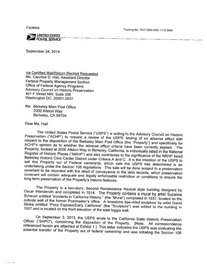 Link to the September 24, 2014 letter from the USPS to the ACHP
Link to the September 24, 2014 letter from the USPS to the ACHP
The ACHP is the authority on the responsibilities of government agencies with regard to historic property. But their role is only advisory. The ACHP supported our request to be a consulting party and wrote to the USPS pointing out that the USPS had not even provided a reason for denying us consulting party status. USPS thinks so much of the ACHP they didn't bother to respond.
So why is the USPS asking the ACHP to issue an opinion on whether they agree with the USPS determination of No Adverse Effect (NAE)? We can find part of the answer by going to the Federal Regulation. Section 800.5 provides an option for an agency when consulting with citizens and communities becomes tiresome: a Finding of No Adverse Effect. After making the finding of no adverse effect, the Agency requests a comment from the ACHP, notifies the consulting parties, waits for the ACHP response, and then issues a response to the ACHP. In the case of the USPS, that response is typically that the USPS disagrees with the ACHP.
From 800.5: "If the final decision of the agency is to affirm the initial finding of no adverse effect, once the summary of the decision has been sent to the Council, the SHPO/THPO, and the consulting parties, the agency official's responsibilities under section 106 are fulfilled."
The table below show that the USPS has gone the NAE (No Adverse Effect) route five times before and in four instances the post offices have been sold (Somerville, Santa Monica, Venice and Ukiah). The fifth, La Jolla, is still at risk. In all of these cases, the ACHP judged the USPS covenant "insufficient."
List of USPS Disposals with ACHP Involvement
|
Post Office |
State |
ACHP Section 106 Action |
Year of Last ACHP Action |
Description |
|
Berkeley |
CA |
NAE opinion |
2014 |
Ongoing consultation |
|
Somerville |
MA |
NAE opinion |
2014 |
ACHP found covenant insufficient |
|
Hoboken |
NJ |
Non-participation |
2014 |
MOA executed |
|
Houston |
TX |
Participation |
2014 |
MOA executed |
|
Santa Monica |
CA |
NAE opinion |
2013 |
ACHP found covenant insufficient |
|
Northfield |
MN |
Technical assistance |
2013 |
Forwarded received public inquiry to USPS |
|
Bronx |
NY |
Technical assistance |
2013 |
Advised USPS on ACHP role in NAE findings consultations |
|
Yankton |
SD |
Technical assistance |
2013 |
SHPO concurred on NAE finding with covenant |
|
La Jolla |
CA |
NAE opinion |
2012 |
ACHP found covenant insufficient |
|
Redlands |
CA |
Technical assistance |
2012 |
Forwarded received public inquiry to USPS |
|
Ukiah |
CA |
NAE opinion |
2012 |
ACHP found covenant insufficient |
|
Venice |
CA |
NAE opinion |
2012 |
ACHP found covenant insufficient |
|
Princeton Palmer Square |
NJ |
Non-participation |
2012 |
MOA executed |
|
Bob Harris Station |
TX |
Non-participation |
2012 |
MOA executed |
|
Westport |
CT |
Non-participation |
2011 |
MOA executed |
|
Peck Slip |
NY |
Non-participation |
2011 |
MOA executed |
|
Eugene |
OR |
Technical assistance |
2011 |
Forwarded received public inquiry to USPS |
|
Medford |
OR |
Technical assistance |
2011 |
Advised USPS on required notification of AE; MOA executed |
|
Gateway Station |
CA |
Non-participation |
2010 |
MOA executed |
|
San Diego Downtown Station |
CA |
Non-participation |
2010 |
MOA executed |
|
Golden Downtown Station |
CO |
Non-participation |
2010 |
MOA executed |
|
Georgetown |
DC |
Non-participation |
2010 |
MOA executed |
|
Terre Haute |
IN |
Non-participation |
2010 |
MOA executed |
|
Bremerton |
WA |
Non-participation |
2010 |
MOA executed |
|
Queen Anne |
WA |
Non-participation |
2010 |
MOA executed |
|
Carnegie |
PA |
Non-participation |
2008 |
MOA executed |
|
Port Townsend |
WA |
Non-participation |
2008 |
MOA executed |
Those of you with long memories will remember that Berkeley Mayor Tom Bates appealed the sale of our post office to the Postal Regulatory Commission (PRC). The USPS called the sale a "relocation" and the PRC refuses to protect citizens against USPS relocations. But our Mayor asked where USPS intended on moving. USPS replied they didn't know but might just lease back the space they need at 2000 Allston Way. Well, what about USPS keeps the building and lease out any excess space. USPS could stay in place and rental revenues could defray maintenance costs. "Oh, No! Managing real estate isn't something USPS does."
So the City of Berkeley agreed to hold the covenant but made it conditional on the USPS agreeing to a long-term lease at 2000 Allston Way from the new buyer. That also wasn't a USPS thing.
Finding the City of Berkeley slow to agree to USPS dictates, the USPS now proposes that the USPS will itself be the covenant holder. This is problematic on many levels. Preservation is not a USPS priority, USPS has a demonstrated problem in working with communities. Moreover, USPS has never before acted as a covenant holder and has no experience administering a covenant. The covenant holder ought to have a licensed architect with historic preservation expertise available for on site determinations. The City of Berkeley has that. The USPS would have to contract locally. The covenant is perpetual but unlike the City of Berkeley, USPS is not requesting compensation for the expenses of "perpetual" administration of the covenant. As the seller of the building AND with a demonstrated greater interest in cash than preservation, the USPS has an inherent conflict in including any covenant language that would impact the sales price of the building. This conflict is reflected in the USPS covenant language which provides for automatic approval of changes to the building if the USPS fails to respond to a request.
For more comments on the problems with the USPS proposal, please read the October 14, 2014 response from attorneys for the City of Berkeley and the National Trust for Historic Preservation.
Click to download a copy of the USPS Proposed Preservation Covenant.
The New Deal Art Work

The USPS doesn't get it. In their letter their Preservation Officer describes the bas-relief as depicting the Pony Express. The letter continues: "These artworks are, and will remain, personal property of the USPS. The USPS intends to enter into a loan agreement with the purchaser that will, among other things, allow the artworks to remain in their current location, allow consistent public access not less than one day per month during normal business hours." So the USPS views these works of public art as their "personal property." Who even knew that the USPS was a person? And of course the notion that access to our art once a month is somehow sufficient is consistent with that view.
In the words of Gray Brechin, "The language of the public good is neither spoken nor understood by those who now run our postal service."
What are our options?
Our Congresswoman Barbara Lee has been our reliable ally. We need to do what we can to prevent 2000 Allston Way from being sold in some dark transaction that we only find out about weeks later. On October 1, Congresswoman Lee wrote Postmaster Patrick Donahoe to request that Mr. Donahoe "formally announce any details of a possible sale of the Berkeley Main Post Office should USPS make the decision to sell that property."
Berkeley citizens have shown amazing resourcefulness in fighting to preserve our historic post office. This fight isn't over. The real fight may just be getting started.
|
ABOUT
The USPS wants to sell Berkeley's historic main post office. Citizens to Save the Berkeley Post Office is a grassroots group that has come together to block the sale of our heritage, stop service cut backs, and preserve living wage postal jobs. Our fight is not unique. Thousands of post office closures across the country mean the largest private auction of public history our nation has ever seen. Join the movement and spread the word. Our post office is not for sale. |
| baha_letter_to_usps.pdf | |
| File Size: | 222 kb |
| File Type: | |
| sample_letter.docx | |
| File Size: | 15 kb |
| File Type: | docx |
Archives
May 2018
March 2018
January 2018
December 2017
August 2015
July 2015
May 2015
April 2015
February 2015
January 2015
November 2014
October 2014
September 2014
August 2014
July 2014
May 2014
December 2013
August 2013
July 2013
June 2013
May 2013
April 2013
March 2013
February 2013
January 2013
